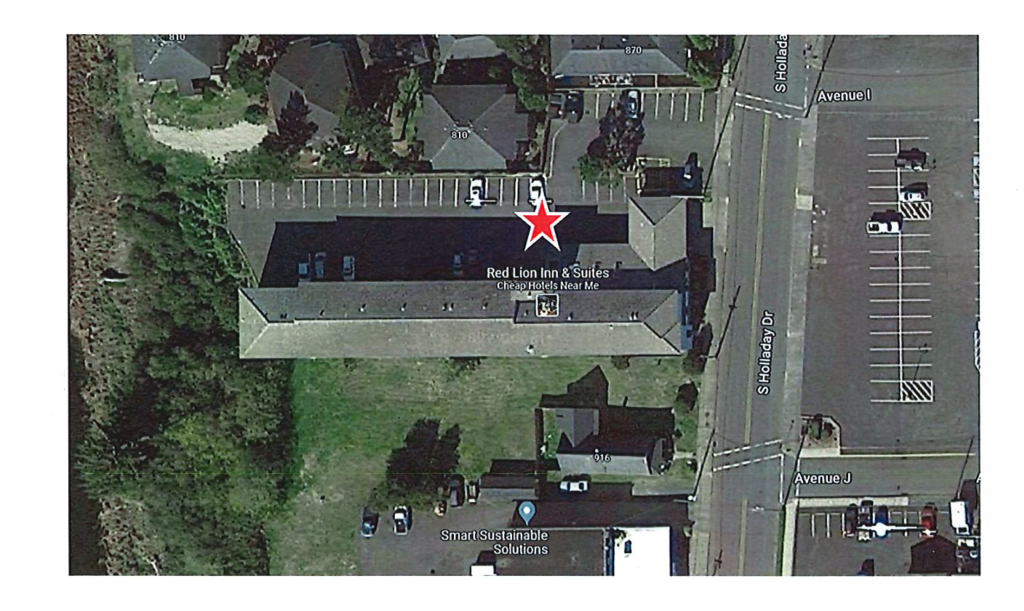CareOregon wins hotel-to-housing conversion
Published 3:00 pm Wednesday, January 4, 2023

- Overhead view of a proposed development at the former Red Lion Inn & Suites.
Representatives of CareOregon won approval from the city Planning Commission to convert the Red Lion Inn & Suites on S. Holladay Drive into 55 apartments.
Up to 35% of the apartments will be affordable to lower-income residents. Social services agencies will maintain an on-site presence to serve residents. The remaining units will be market rate and geared toward regional medical and social services staff.
“The hotel purchase is an investment on behalf of CareOregon to support both our members and our providers who support our members in the three-county region,” said Leslie Ford, the housing strategy and development adviser for the Columbia Pacific Coordinated Care Organization, which oversees Medicaid in Clatsop, Columbia and Tillamook counties under the umbrella of CareOregon.
Ford said repurposing hotels or motels into housing is about half the cost of new construction. “It’s an efficient, economical way to get housing for our health care staff and for our members,” she said.
CareOregon has created an LLC that will own the project. Columbia Pacific Coordinated Care Organization will oversee the management.
“We’re in here for the long haul,” Ford said. “This is permanent housing. These are folks that are ready to live independently and probably have been living independently in their own different ways.”
More than a third of the apartments will be designated for people who earn 30% of the area median income. Clatsop Community Action and Clatsop Behavioral Healthcare will deliver on-site care and services for residents, including those who have experienced homelessness.
Case managers will provide assessments, determine program eligibility, develop case plans and link residents with community-based resources.
Building maintenance and management will come from rent from market-rate tenants, while services and vouchers for affordable units are the responsibility of the coordinated care organization, Ford said.
The market-rent housing will be geared to medical and social services providers, she said.
“We need housing that supports our members, but we can’t support our members if we don’t have providers who are working in our region,” Ford said.
Pam Cooper, the director of finance at Providence Seaside Hospital, manages the team for transitional rentals for health care workers.
“In the last year I would say we’ve had probably 10 therapists and physicians turn down jobs because they could not find housing,” Cooper said at the Planning Commission meeting. “Usually I put them in a transitional place until they can find housing. It’s gotten very severe.”
Converting the Red Lion has the potential to help with Seaside’s housing needs in a timely way, architect and planning consultant Stuart Emmons said, speaking on behalf of CareOregon.
“It’s faster to occupy because the shell of the building is already complete, so only the interior for the most part will need some modifications,” he said.
Fifty-two of the apartments are planned as studios and three as one-bedroom units.
Jeff Flory, the city’s planning director, recommended the Planning Commission approve the applicant’s request subject to conditions, including a short- and long-term bike parking plan, screening of trash and recycling areas, a new fire hydrant in the northwest corner of the parking lot and a change of occupancy permit.
The commission added conditions, including 24/7 site management and EV charging stations compliant with state codes.
Neighbor Diana Rapp said she understood the need for low-income housing, but said the proposed on-site care and services made her feel unsafe.
“I already know what that neighborhood is like,” Rapp said. “I live there. And this is just going to make it worse. I’m very concerned about it. I understand that probably won’t change your decision. But it is lowering my property value and making me feel very unsafe in a town that is already not so great anymore.”
Ford responded that similar projects have maintained “very good relationships with our community partners and our neighbors.” She added that these are housing support projects, not clinical treatment services, and that Care Oregon aims to meet neighbor concerns through an open-door policy with residents in the neighborhood.
As for a new name for the former hotel, CareOregon hasn’t come to a decision.





